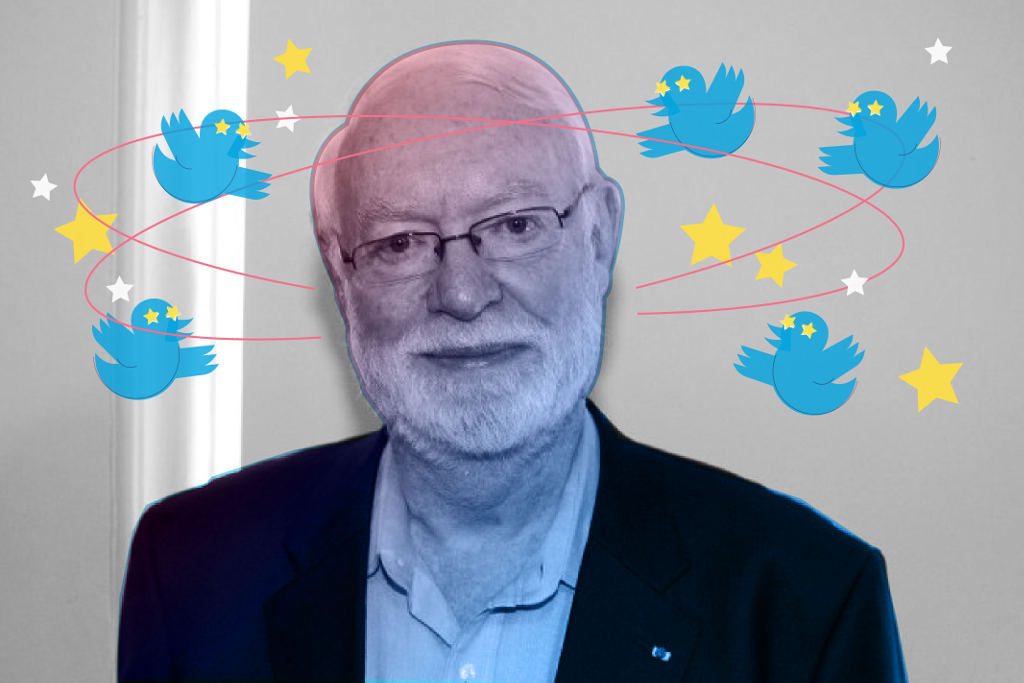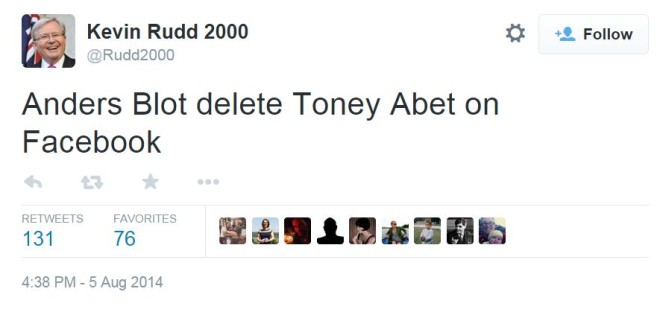The Five Worst Fake Twitter Accounts That Are Ruining It For The Rest Of Us
If you’re going to dedicate your online activities to a fake persona, you'd better have a good reason and the creativity to back it up.

Look, we all know that it’s our natural right to go on the internet and forget our pathetic lives by pretending to be someone new. In a way, deep down, we’re all catfishers, somehow.
But if you’re going to dedicate your online activities to a fake persona, or a persona adopted from someone else, you better have a good reason and the creativity to back it up.
Verification notwithstanding, Twitter has pretty vague guidelines on ensuring that an account holder is who they say they are. As long as the user name has a slightly weird format, or a couple of weird letter substitutions, you can pretend to be pretty much any public figure, with maybe a mild disclaimer in the account description to give yourself deniability.
There is obviously a great deal of fun to be had here. Junkee itself got in the mix around a Mia Freedman parody account last year [No Crikey, it wasn’t us — ed.]. That account lived fast and died young, which is one of the ways to stay successful in the fake Twitter game.
Shtick-y internet personas always have a swift expiration date. If longevity is your aim, you have to be prepared to push that shtick into increasingly outré directions. Think something like @Seinfeld2000, which every time it gets barely tolerable pulls out something truly incredible, like a videogame sound tracked by Ezra Koenig.
It’s a delicate line to walk, but when they’re bad—and they get pretty bad—a fake Twitter account is the absolute pits. Here are five of the worst.
–
#5: @Rudd2000
Followers: 5550
First tweet: November 14, 2013
Last tweet: September 1, 2014
The bottom line is this: @Rudd2000 was a parody account that ripped off another parody account that is itself a parody of another parody account. It took the voice and style of @Seinfeld2000 and did absolutely nothing to it, except apply it to the softest target in all of Australian politics.
Yes, people enjoyed it. Junkee called it one of the three satirical auspol accounts you should follow, and mourned its demise. Fairfax wrote that it “set the political Twittersphere alight with sharp political satire delivered through savvy Internet speak”.
But look at that Fairfax quote now. I submit to you that, in abstract, what it is describing sounds like the worst thing ever — and worse still, because the account itself was so totally unoriginal.
The two guys behind this profile did one thing right: they got out quickly, ceasing all activity in October last year. But they also finished with a book deal, which just makes me sad.
–
#4: @BiIIMurray
Followers: 488,000+
First Tweet: January 30, 2013
Bill Murray may be the Internet’s own folk hero, but he almost certainly doesn’t give a damn. Which is why the idea of him operating a Twitter account is absurd. Which is also why the 488-thousand-ish follower number for this profile is depressing to me.
Unoriginality isn’t the problem here. It’s intent. Like many fake twitter accounts, this one styles itself as a ‘parody’, but I think the user either doesn’t really know what that word means or is being deliberately disingenuous.
The parody disclaimer seems to be a minimal attempt to avoid the perception of identity theft, since nothing here is parodic, and everything is just a lame attempt to write a joke of the sort that Bill Murray (on his worst day) might maybe say.
So you mean to tell me a stress ball isn’t for throwing at people who stress you out?
— Bill Murray (@BiIIMurray) February 22, 2015
The jokes might be original, but everything about this account announces that the user would be happy if people thought they were the real Murray. The saddest thing here is imagining the person behind the account has a genuine love of comedy—maybe even harbours aspirations to be a comedian—but is a total failure in their real life, and has resigned him or her self to blithely piggy-backing on someone else’s success.
–
#3: @TheTweetOfGod
Followers: 1.83 million
First tweet: October 22, 2010
Like the Bill Murray one, this profile–not to be confused with the Facebook God–is another example of a user grasping upon a popular, pre-fab persona and using it to drive their crappy content to heights of unearned fame. Here, Emmy Award winning comedy writer David Javerbaum gets to pose as the Christian deity, while publishing ‘humorous’ swipes at religious belief.
Someday people of all religions will learn to live together in peace and religionlessness. — God (@TheTweetOfGod) February 11, 2015
The thing that really bugs me about this is that there’s a kind of fallacy of authority in play. Javerbaum’s religious critique is about on the level of a sixteen-year-old philosophy student who just learned about the Problem of Evil, but due to this persona he gets to push it in front of millions. He’s even got a play in development, starring Sheldon from The Big Bang Theory.
–
#2: @DavidStratton9
Followers: 13,000+
First tweet: March 2, 2013
In June 2013, Dee Jefferson interviewed David Stratton on Junkee to get his take on this Twitter imitation. His verdict: “Unsettling”. Stratton seems like a dear man, and we can all assume that he doesn’t care about or maybe even understand Twitter, and so he didn’t seem to have the confidence to cut to the heart of the matter: this is trash. The first problem here is the user’s choice of target. The real Stratton is a distinguished Australian critic, but he plainly does not possess a distinctive enough voice as a public personality for it to be worth imitating. His métier is dry commentary and analysis – nothing demonstrative about it. It’s baffling that someone would try to impersonate him, much less—as he cautiously flags in that interview—circulate political commentary in his name, of the sort that the real Stratton has avoided throughout his career. The second problem is the user’s choice of content. The writing is absolutely inane, unless you’re all about tediously of-the-moment pop culture references and worthless ideological posturing.
Michael Moore calling combat snipers ‘cowards’ was a very brave move from a fat slob slouched over a laptop on social media.
— David Stratton (@DavidStratton9) February 9, 2015
That tweet is worth dissecting. Nothing about it seems applicable to Stratton’s establish public persona, except that it is, tangentially, about movies. The profile description calls it a “loving tribute”, but most of the tweets are just crass, and kind of mean.
When I read this stuff I see a person who believes that the rubric of ‘parody’ allows them to do whatever they like. This is not the fun kind of imitation. It’s the someone-has-stolen-your identity-and-gone-around-exposing-themselves-to-strangers kind.
–
#1: @thereaIbanksy
Followers: 1.19 million
First tweet: October 25, 2013
This account holder has stolen the name of a famous artist, but they can’t even be bothered to use it to push their own crappy creative works. Instead, they just re-post the work of actual professional artists—usually without attribution—alongside embarrassingly manipulative emotional pabulum.
Don’t get me wrong, the real Banksy has a sentimental streak the size of a cricket pitch, but at least he marries it to a sharp political edge. This account is just sappy, and also highly deceptive. I would bet money that, despite the ‘fan account’ disclaimer, many among this profile’s 1.18 million follows believe Banksy himself is the author behind every work posted there.
@therealbanksy has the worst qualities of the preceding four account combined. It is implicitly deceptive, premised on an unearned authority, misrepresentative of the real figure it imitates, and profoundly unoriginal in content. The only thing that could possibly redeem this would be if we learned that it was actually run by the real Banksy, trolling his followers with a devastating satire on his own growing irrelevance. But I doubt that will happen.
–
James Robert Douglas is a freelance writer and critic in Melbourne. He tweets from @jamesrobdouglas
Feature image by Matt Roden

